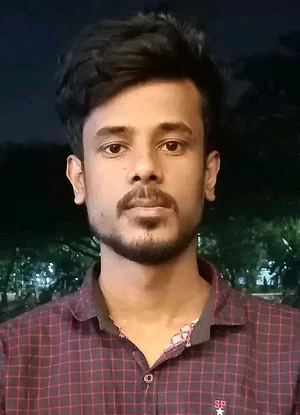On August 5, Kamal Hossain (26) left his home to join the anti-discrimination student movement. The next morning, his burned body was found in Dhaka’s Dhanmondi area. The name “Kamal” was written on the back of the shirt he was wearing. A local resident, using Kamal’s phone after removing the SIM card, called his family to inform them of his death.
Kamal Hossain was from Khuliarchar village in Rajibpur Union, Ishwarganj Upazila, Mymensingh. He was the third of six brothers, the son of farmer Hashim Uddin and Majida Khatun. Two years ago, Kamal married Sharmin Akter from Noakhali. They lived together in Lalbagh, Dhaka, where Kamal worked as a cook in a hotel and occasionally drove a rickshaw.
Kamal’s older brother, Liton Mia, said, “We got the news about Kamal around 10 a.m. on August 6. Someone called and said his body was lying there. When we found the body, it was completely burned. His skin had turned black, and his face was partially damaged. There was no way to identify him by his face. But we recognized him by the name on his shirt, his pants, and his mobile phone.”
Liton added that they only received his body and had no information about how Kamal died. They brought the body directly home without any autopsy.
According to his family, Kamal couldn’t continue his studies due to financial hardship. For the past 15 years, he had worked as a cook in Dhaka to support his family. Although he couldn’t study, he was paying for his younger brother Hadis Mia’s education at a Qawmi madrasa in Narsingdi. After Kamal’s death, their father brought Hadis back home because they could no longer afford the tuition fees. Kamal was also paying for his younger sister, Alifa Khatun, to attend a local women’s madrasa.
Kamal was buried on the evening of August 6 at a field near Khuliarchar Jame Mosque, beside the Kachamatia River in Ishwarganj. On Wednesday, his father, Hashim Uddin, was found near his grave, worried about the rainwater causing the ground to sink. Hashim Uddin said, “There were no visible injuries on my son’s body. It was just burned all over.” Hashim, a day laborer, broke down in tears, recalling how his son used to say, “Stop working so hard and focus on praying, go to the mosque, and take time for religious devotion. I’ll take care of all the expenses for the household and my siblings’ education.” With deep sorrow, Hashim added, “But my son is gone now. When I think of him, it feels like my life is slipping away.” He called for justice for his son’s death.
Kamal’s mother, Majida Khatun, wept, saying, “He was the core of my heart. He took care of the family. Now he is gone forever.”
